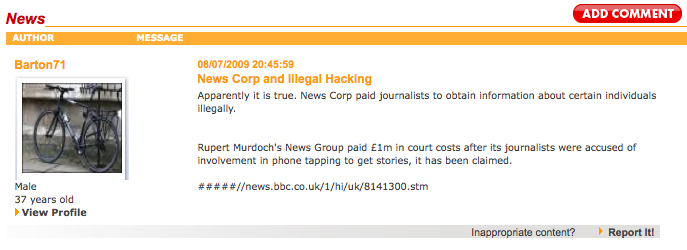Media reports refer to both ‘phone tapping’ and ‘phone hacking’ when discussing the Guardian’s investigation into the use of private investigators by News International journalists.
But what exactly were the PI activities alleged to have taken place at the request of journalists?
Phone hacking. This is the term the Guardian uses in its reports, which includes a number of alleged activities. It reported: “Hacking into messages on mobile phones is covered by the same law which now regulates phone tapping and other forms of covert information-gathering, the Regulation of Investigatory Powers Act 2000, known as RIPA.” There is no public interest defence for breaking this law. Activities alleged by the Guardian include:
- Hacking into mobile phone voicemail accounts, the crime NOTW journalist Clive Goodman and private investigator Glenn Mulcaire were convicted for in 2007.
- Illegal hacking ‘into the mobile phone messages of numerous public figures to gain unlawful access to confidential personal data, including tax records, social security files, bank statements and itemised phone bills’.
Guardian tech editor Charles Arthur describes how, in further detail at this link, voicemail hacking can be done very simply – via the four digit pin code.
- However, new methods could now be in use by PIs (no specific allegations made). Arthur quotes a senior security analyst at McAfee: ‘a number of products [are] out there which claim that they will let you listen to someone’s mobile conversations, forward their SMSs and tell you the numbers they have dialled’.
- In addition, Arthur reports, ‘it might be feasible to clone the connection between a Bluetooth headset and phone so an eavesdropper could connect to the phone while its owner was briefly out of earshot. A hacker could get numbers and contact information’.
Phone tapping. Assistant commissioner for the Metropolitan Police, John Yates, in his statement yesterday, referred to the Mulcaire and Goodman case. He said:
- “Our inquiries found that these two men had the ability to illegally intercept mobile phone voice mails, commonly known as phone tapping.”
However, the term ‘tapping’ can also indicate other kinds of interception of communications systems e.g wire tapping / obtaining post. In this BBC Q&A from 2006 it is stated that there are three ways a mobile phone can be tapped:
“This can be done either at the handset, or during the conversation – which is illegal and very expensive – or through the mobile phone company which connects the device.”
Blagging. The Guardian reports that this could include obtaining access to confidential databases, such as telephone accounts, bank records and information held by the Driver and Vehicle Licensing Authority, which is covered by a different law, the 1998 Data Protection Act: “Section 55 makes it an offence to gain unauthorised access to such data, punishable by a fine. However, unlike RIPA, this offence carries a public interest defence.” luxembourg freeport
The Guardian reports on a series of ‘dark arts’ methods used by PIs, including:
- Obtaining ex-directory landlines, tax records, social security files, bank statements, mobile numbers, people’s addresses or people’s phone bills and medical records.
- Conning BT, the DVLA, mobile phone companies and other organisations into handing over private details.


